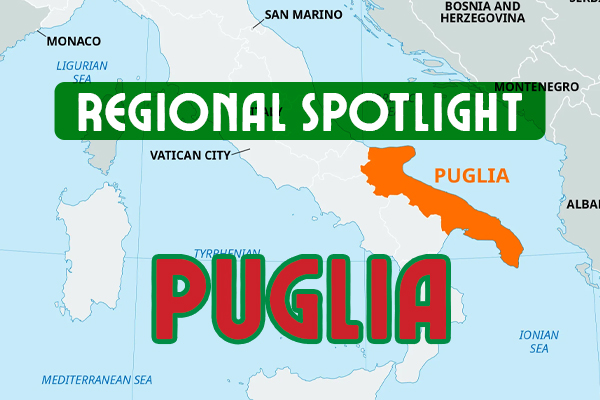Explore the sun-drenched region of Puglia, where stunning coastlines, historic towns, and delectable cuisine await. From the ancient trulli of Alberobello to the vibrant streets of Lecce, discover the unique charm of Italy’s heel.
Location and Climate
Puglia, also known as Apulia, is situated in the southeastern part of Italy, forming the heel of the Italian boot. It is bordered by the Adriatic Sea to the east, the Ionian Sea to the southeast, and the regions of Molise, Campania, and Basilicata to the north and west. Puglia’s diverse landscape includes a long coastline with beautiful beaches, rolling plains, and fertile agricultural land.
The climate in Puglia is typically Mediterranean, characterized by hot, dry summers and mild, wet winters. Coastal areas enjoy temperate conditions year-round, while inland regions can experience more extreme temperatures. The region’s sunny weather makes it an ideal destination for beach holidays and outdoor activities.
Historical Tapestry
Puglia’s history is a rich tapestry woven from the influences of various civilizations that have settled in the region over millennia. Key historical periods include:
Ancient Greeks and Romans: Puglia was an important region for both the Greeks and Romans, who established numerous colonies and trade routes. The city of Taranto, founded by the Spartans, became a major Greek settlement, while the Romans built extensive infrastructure, including roads and aqueducts.
Byzantine and Norman Rule: Following the fall of the Roman Empire, Puglia came under Byzantine control, which left a lasting impact on its architecture and culture. The Normans later conquered the region, further enriching its cultural heritage with Romanesque architecture.
Medieval and Renaissance Periods: During the Middle Ages, Puglia saw the rise of powerful city-states and the construction of impressive castles and cathedrals. The Renaissance brought renewed artistic and architectural activity, particularly in cities like Lecce.
Modern Era: Puglia became part of the Kingdom of Italy in the 19th century and has since developed into a vibrant region known for its agriculture, tourism, and cultural festivals.
Key Cities
Bari: The capital of Puglia, Bari is a bustling port city with a rich history and vibrant cultural scene. Key attractions include the Basilica of San Nicola, the Swabian Castle, and the charming old town (Bari Vecchia), with its narrow streets and historic buildings.
Lecce: Often referred to as the “Florence of the South,” Lecce is renowned for its stunning baroque architecture. Highlights include the Lecce Cathedral, the Basilica di Santa Croce, and the Roman amphitheater. The city’s lively squares and elegant palazzi make it a delight to explore.
Brindisi: This coastal city has been an important port since ancient times. Notable sites include the Roman column marking the end of the Appian Way, the Castello Svevo, and the Church of Santa Maria del Casale.
Taranto: Known as the “Spartan City,” Taranto boasts a rich history dating back to its founding by the Spartans. Key attractions include the Aragonese Castle, the National Archaeological Museum of Taranto, and the Cathedral of San Cataldo.
Alberobello: Famous for its unique trulli houses, Alberobello is a UNESCO World Heritage site. These whitewashed, conical-roofed structures create a picturesque and distinctive landscape.
Culinary Delights
Puglian cuisine is celebrated for its simplicity, freshness, and use of locally sourced ingredients. The region’s culinary traditions reflect its agricultural heritage and coastal influences. Key culinary highlights include:
Orecchiette: This ear-shaped pasta is a staple of Puglian cuisine, often served with broccoli rabe (orecchiette alle cime di rapa) or a rich tomato sauce with meatballs.
Taralli: These crunchy, ring-shaped bread snacks are flavored with fennel seeds, black pepper, or wine, making them a popular accompaniment to wine or aperitifs.
Burrata: A creamy, fresh cheese made from mozzarella and cream, burrata is a delicacy often enjoyed with ripe tomatoes, olive oil, and fresh basil.
Focaccia Barese: This thick, soft bread is topped with cherry tomatoes, olives, and a generous drizzle of olive oil, making it a delicious snack or appetizer.
Seafood: Given its extensive coastline, Puglia offers an abundance of fresh seafood. Specialties include octopus, sea urchins, mussels, and various types of fish, often grilled or served in pasta dishes.
Agricultural Highlights
Agriculture is a cornerstone of Puglia’s economy, with the region producing a wide range of high-quality products. Key agricultural highlights include:
Olive Oil: Puglia is one of Italy’s leading olive oil-producing regions, known for its high-quality extra virgin olive oil. The region’s ancient olive groves, some dating back thousands of years, are a testament to its long-standing olive cultivation tradition.
Wine: Puglia boasts a diverse range of wines, including robust reds like Primitivo and Negroamaro, as well as crisp whites such as Verdeca and Fiano. The region’s vineyards benefit from the sunny climate and fertile soil.
Almonds and Figs: Puglia’s almond and fig trees produce some of the finest nuts and fruits in Italy, used in a variety of traditional sweets and dishes.
Wheat: The fertile plains of Puglia are ideal for growing durum wheat, which is used to make high-quality pasta and bread.
Tourism and Major Attractions
Tourism is a major industry in Puglia, with visitors drawn to its beautiful beaches, historic sites, and vibrant culture. Major attractions and activities include:
Alberobello: Explore the enchanting trulli houses and learn about their unique construction and historical significance. The town’s picturesque streets and charming shops offer a delightful experience.
Ostuni: Known as the “White City” for its whitewashed buildings, Ostuni is perched on a hilltop with stunning views of the surrounding countryside and the Adriatic Sea. The town’s narrow streets, historic churches, and vibrant piazzas make it a must-visit destination.
Polignano a Mare: This coastal town is famous for its dramatic cliffs and crystal-clear waters. The historic center, with its narrow streets and charming balconies, offers breathtaking views of the Adriatic.
Castel del Monte: A UNESCO World Heritage site, this unique 13th-century castle built by Emperor Frederick II is known for its octagonal shape and architectural significance.
Gargano National Park: This protected area in northern Puglia features diverse landscapes, including forests, mountains, and coastline. Popular activities include hiking, cycling, and exploring the picturesque Tremiti Islands.
Salento Peninsula: The southernmost part of Puglia, the Salento Peninsula, is known for its beautiful beaches, clear waters, and lively towns. Key destinations include Gallipoli, Otranto, and Santa Maria di Leuca.
Things to See and Do
Whether you’re interested in history, nature, or relaxation, Puglia offers a wide range of activities to suit all interests. Here are some top recommendations:
Visit Historic Churches: Explore the region’s stunning churches, including the Basilica of San Nicola in Bari, the Cathedral of Lecce, and the Church of San Giovanni al Sepolcro in Brindisi.
Relax on the Beaches: Puglia boasts some of Italy’s most beautiful beaches, including those in the Gargano Peninsula, Salento, and along the Adriatic and Ionian coasts.
Taste Local Cuisine: Sample Puglian specialties like orecchiette, burrata, and seafood at local trattorias and markets. Don’t miss the chance to try the region’s olive oil and wine.
Explore Ancient Ruins: Discover the ancient Greek and Roman ruins scattered across the region, including the archaeological sites in Taranto and the Roman amphitheater in Lecce.
Attend Local Festivals: Immerse yourself in Puglian culture at festivals such as the Festa di San Nicola in Bari, the Notte della Taranta in Salento, and the Carnival of Putignano.
Conclusion
Puglia, with its sun-drenched landscapes, rich history, and vibrant culture, is a region that offers something for everyone. Whether you’re exploring historic towns, savoring local cuisine, or relaxing on pristine beaches, Puglia provides an unforgettable experience. This region’s unique blend of natural beauty and cultural heritage makes it a must-visit destination for anyone seeking to discover the diverse charms of Italy.

